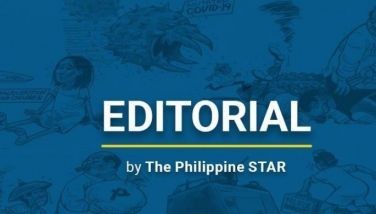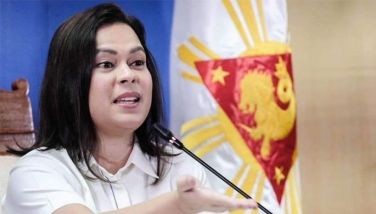Philippine foreign policy taking center stage

The keynote address of President Ferdinand Marcos Jr. at the recent International Institute for Strategic Studies (IISS) Shangri-La Dialogue in Singapore was nothing less than historic. For the first time ever, a Philippine president delivered a speech to open the region’s top defense forum. Because of the worldwide attention we are getting in the region, his speech reverberated all over the world, particularly here in Washington, DC.
The President’s speech was very much applauded, with IISS director-general and chief executive Sir John Chipman remarking, “That is the keynote speech that we needed” because it helped set the agenda, provoked their thinking and spurred them into action.
A number of analysts praised the President’s speech for being subtle yet sophisticated, excellently articulating the Philippines’ adherence to international rule of law and its firm commitment to regional and global peace. In his speech, the President emphasized that as responsible members of the international community, nations must adhere to and strengthen the rules-based international order.
“We renew this commitment at this turbulent juncture of our history. I will repeat what I said at the United Nations almost two years ago: amidst challenging global tides, an important ballast stabilizes our common vessel. Our open, inclusive and rules-based international order is governed by international law and informed by the principles of equity and of justice,” President Marcos said.
The President’s words were the perfect response to the observation made by Sir John Chipman that we are seeing a “rules-broken international order. The rules have been marginalized by a multiplicity of bad actors while the good strategic habits for their maintenance have withered and little effort has been made to rekindle them.”
There is no doubt that the attention being given to the Philippines is even greater than ever, with our foreign policy now taking center stage. In fact, a number of leaders worldwide have been wanting to meet the President. Ukraine President Volodymyr Zelensky went out of his way to see the President in Manila due to the fact that their schedules could not jibe during the Shangri-La Dialogue in Singapore.
President Zelensky invited President Marcos to attend the Global Peace Summit in Switzerland – knowing fully well PBBM’s presence will lend credence to the leaders’ summit whose main objective is to be united in looking for peaceful solutions to the problems the world faces today.
US congressmen and senators who attended the Shangri-La Dialogue flocked to President Marcos’ table during the gala dinner that it seemed like a small summit was taking place, with practically everyone wanting to talk with him. Obviously, the President is at the center of attention and people are eager to hear his thoughts not only on defense and security but also on the economic front. Here in Washington, we are pleased to see both Democrats and Republicans supporting the Philippines and the central role we play in the Indo-Pacific region.
Because of the attention we are getting in our region, we have been getting a lot of invitations to speak at economic and security forums. On June 12, I will be speaking at the Committee on Economic Development (CED)’s Spring 2024 Trustee Policy Summit. The CED is the public policy think-tank of The Conference Board, a nonprofit organization composed of over 1,000 companies and organizations encompassing 60 countries.
Last Thursday, I was one of the speakers at the Center for a New American Security (CNAS) session on the topic, “Rise of the Minilateral: A New Model for Geopolitics in the Indo-Pacific” along with Japanese Ambassador Shigeo Yamada, the State Department’s Deputy Assistant Secretary in the Bureau of East Asian and Pacific Affairs Camille Dawson and CNAS Senior Fellow for the Indo-Pacific Security Program Jacob Stokes. Moderating the session was Lisa Curtis, director of the Indo-Pacific Security Program at CNAS.
I underscored the President’s remarks at the Shangri-La Dialogue that “all partnerships and arrangements must never displace or dilute, but rather uphold and complement, ASEAN’s central role,” reiterating that one of the three constants that guide our efforts in preparing for the challenges ahead is that ASEAN and ASEAN-led processes must remain central.
Recognizing the importance of minilateralism, the President highlighted the “collaborative endeavors among a few states that share specific interests built into pillars that support the architecture of regional stability.”
There is no doubt the Philippines has benefited from minilateralism, which I believe continues to be a viable option for nations that promote cooperation in dealing with issues of mutual concern.
In 2002, we worked with Indonesia and Malaysia through an information exchange agreement to combat transnational crimes. In 2017, we entered into a trilateral agreement to conduct joint patrols and share information following a series of kidnapping activities by the Abu Sayyaf Group. Last April, the Philippines, Japan and the US entered into a trilateral cooperation agreement to advance security and economic prosperity among the three nations. In May, the Philippines, Australia, Japan and the US pursued further collaboration to promote a free, open, secure and prosperous Indo-Pacific.
No doubt minilateralism enables small countries to address common challenges when they put their resources together, and these efforts become even stronger and more effective when backed by middle and global powers.
Let it be clear, however, that while we endeavor to build and strengthen our partnerships with our friends and neighbors in the region, our commitment to ASEAN remains a core element of our foreign policy.
All these efforts are in keeping with President Marcos’ pronouncement during the early days of his administration that the Philippines remains a peace-loving nation that merely wants to protect its territorial integrity.
* * *
Email: [email protected]
- Latest
- Trending




























